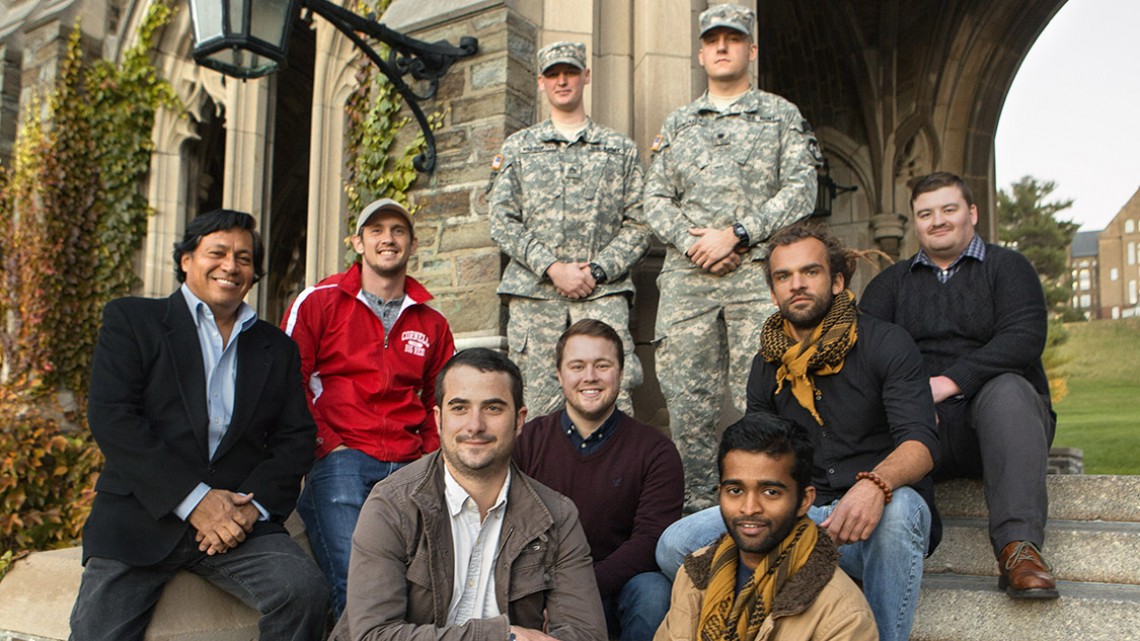
Members of the Undergraduate Veterans Association, which formed in 2015 to advocate for better support and a stronger community, at the War Memorial Arch on Veterans Day 2016.
Alumni gifts exemplify Cornell’s commitment to student veterans
By Kate Klein
Cornell has a proud history of welcoming military veterans, exemplified by the Class of 1950: 64 percent of the 1,956-member class were veterans of World War II, many of them funded by the G.I. Bill. That history continues for a new generation, thanks to grassroots organizing efforts by student veterans, a renewed commitment from university leaders and increased alumni engagement. Two recent gifts exemplify and further efforts to recruit and support veterans at Cornell.
Helping student veterans navigate challenges
In March, the Adelphic Cornell Educational Fund, associated with Alpha Delta Phi fraternity, committed $200,000 to enhance the Cornell experience for student veterans. This gift established a new veterans advocate to serve as a point of contact for all student veterans and to recruit veterans to Cornell. The first to fill this position, Barbara Thompson joined the dean of students office in August and helps student veterans stay organized academically and transition from military to college life. She also connects student veterans to on-campus resources, including registrar and financial aid staff members certified to process military benefits.
“The student veterans advocate is the first dedicated resource at Cornell that will help veterans navigate these challenges,” said Dean of Students Vijay Pendakur. His goal for the part-time, three-year term position is that Thompson will “work to alleviate academic, social and financial hurdles that [they] face so that they can focus on being students.”
It wasn’t easy for David Outlaw ’17, a U.S. Navy veteran, to concentrate on being a student when he entered Cornell’s School of Hotel Administration in 2014. Faced with challenges processing his Yellow Ribbon benefits that enhance the G.I. Bill and identifying other student veterans, in 2015 he and Seamus Murphy ’17 founded the Cornell Undergraduate Veterans Association (CUVA) to advocate for better support and a stronger community.
“CUVA’s aim is to create an academic environment that requires the veteran be only concerned with one thing – their studies,” said Luke Opyd ’18, CUVA president.
Dialogue between CUVA and members of Cornell’s senior administration is bringing positive change. The financial aid and registrar’s offices now have staff members dedicated to military veterans. A new website, military.cornell.edu, consolidates information about benefits, programs and recruiting for Cornell’s military community. And in July 2017, Provost Michael I. Kotlikoff announced an ambitious goal in a post on the Higher Education Today website: Cornell would quadruple its number of undergraduate military veterans by 2020.
“We must all do a better job at reaching out to students who have served this country and who have much to offer undergraduate communities,” Kotlikoff wrote, speaking for Ivy League and other elite institutions.
The number of undergraduate student veterans at Cornell has risen from about five in 2014 to more than 20 in 2017, said Vice Provost Judith Appleton.
Permanent scholarship support
In contrast, the population of professional and graduate student veterans at Cornell is strong, particularly at the Samuel Curtis Johnson Graduate School of Management in the Cornell SC Johnson College of Business. In 2017, 43 veterans were enrolled in Johnson’s residential MBA programs, comprising 11 percent of domestic students in the classes of 2017 and 2018.
In April 2017, Peter Nolan ’80, MBA ’82, and his wife, Stephanie Nolan ’84, made support for student veterans permanent at Johnson by endowing a scholarship fund. The Peter and Stephanie Nolan Veterans Professional Scholarship Fund comprises $6 million from the Nolans and $2 million in current-use funds from the Cornell SC Johnson College of Business challenge, and builds on $2 million in scholarships the couple gave previously.
Peter Nolan, who worked with and hired several veterans during his capital management career, said he believes supporting military veterans is the right thing to do after they have put their lives at risk.
“Veterans are proven leaders already,” he said. “Their leadership skills are critical to their successful completion of their MBAs and subsequent careers as business leaders.”
Engaging after graduation
Graduate and undergraduate student veterans bring rich experiences and unique perspectives to Cornell, Appleton said. Likewise, veterans bring something special to Cornell’s alumni community, said Matt Carcella, director of Alumni Diversity Programs for Alumni Affairs and Development.
Two events at Reunion 2017 gathered alumni veterans, and the AAD office of diversity programs surveyed alumni veterans earlier this year to learn how to serve them better.
“Like Cornell’s other diverse communities, veterans deserve the coherence and resources they need to thrive – not only as students but after they graduate,” Carcella said. “As the student veteran population grows, so does the alumni veteran community. I’m excited to see how these military veterans engage with the university in the future.”
Kate Klein is a writer for Alumni Affairs and Development.
This story originally appeared in the fall 2017 issue of Ezra magazine.
Media Contact
Get Cornell news delivered right to your inbox.
Subscribe